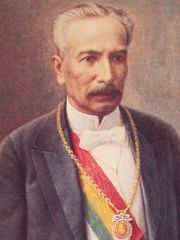
Mariano Baptista
Encyclopedia

Cochabamba
Cochabamba is a city in central Bolivia, located in a valley bearing the same name in the Andes mountain range. It is the capital of the Cochabamba Department and is the fourth largest city in Bolivia with an urban population of 608,276 and a metropolitan population of more than 1,000,000 people...
, March 19, 1907) was President of Bolivia
President of Bolivia
The President of Bolivia is head of state and head of government of Bolivia. According to the current Constitution, the president is elected by popular vote to a five year term, renewable once...
during the 1892-96 period. A member of the Conservative Party, he was renowned for his stirring oratorical style.
Much more agreeable and less severe than his predecessor Aniceto Arce
Aniceto Arce
Aniceto Arce Ruiz was President of Bolivia from 1888 until 1892. The Aniceto Arce Province is named after him. Arce was a native of Tarija but was educated as a lawyer and resided most of his life in Sucre, where he became one of the country's foremost silver-mining tycoons...
, Baptista vowed to open up the political process and decompress the climate of mutual mistrust between Liberals
Liberal Party (Bolivia)
The Liberal Party was one of two major political parties in Bolivia in the late 19th century and the first half of the 20th century. The other was the Conservative Party. The Liberal Party was formally founded in 1883 by Eliodoro Camacho...
and Conservatives
Conservative Party (Bolivia)
The Conservative Party was one of two major political parties in Bolivia in the late 19th century. The other was the Liberal Party. Between 1880 and 1899, all of the Presidents of Bolivia were members of the Conservative Party....
. To this end, he proclaimed amnesty and did his best to rule transparently and by the rule of law. However, popular fatigue with the Conservatives' successful efforts at replicating themselves in power eroded his support. His reputation took another serious blow when ex-President Hilarión Daza
Hilarión Daza
Hilarión Daza Groselle was President of Bolivia from 1876 to 1879.A career military officer and native of Sucre, Daza came to power on May 4, 1876 in a coup against the constitutional president Tomás Frías. He was supported by much of the country's financial elite because of his avowal to maintain...
, who had decided to return to Bolivia from exile to explain his controversial actions during the War of the Pacific
War of the Pacific
The War of the Pacific took place in western South America from 1879 through 1883. Chile fought against Bolivia and Peru. Despite cooperation among the three nations in the war against Spain, disputes soon arose over the mineral-rich Peruvian provinces of Tarapaca, Tacna, and Arica, and the...
, was murdered by his own guards upon entering the country from Chile via railway. His murder was never explained, and no one was punished. Most Bolivians felt that Daza's presence (and willingness to talk) discomforted many old wartime leaders of Conservative persuasion (including Arce) and reopened barely healed wounds. In sum, Daza's murder was hung around Baptista like an albatross for the rest of his life. Meanwhile, the political climate continued to deteriorate, presaging the coming of the end of Conservative rule.
Still, some important international treaties were signed during the Baptista administration, especially with Argentina
Argentina
Argentina , officially the Argentine Republic , is the second largest country in South America by land area, after Brazil. It is constituted as a federation of 23 provinces and an autonomous city, Buenos Aires...
in regard to the Puna de Atacama, with Paraguay
Paraguay
Paraguay , officially the Republic of Paraguay , is a landlocked country in South America. It is bordered by Argentina to the south and southwest, Brazil to the east and northeast, and Bolivia to the northwest. Paraguay lies on both banks of the Paraguay River, which runs through the center of the...
concerning the disputed Chaco region, and others with Brazil
Brazil
Brazil , officially the Federative Republic of Brazil , is the largest country in South America. It is the world's fifth largest country, both by geographical area and by population with over 192 million people...
and Peru
Peru
Peru , officially the Republic of Peru , is a country in western South America. It is bordered on the north by Ecuador and Colombia, on the east by Brazil, on the southeast by Bolivia, on the south by Chile, and on the west by the Pacific Ocean....
. Baptista was also involved in the signing of the first (preliminary) peace treaty ending the War of the Pacific. He retired from politics after the end of his term and died in 1907.

